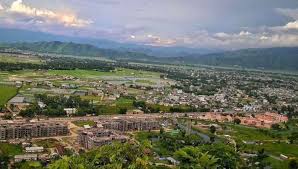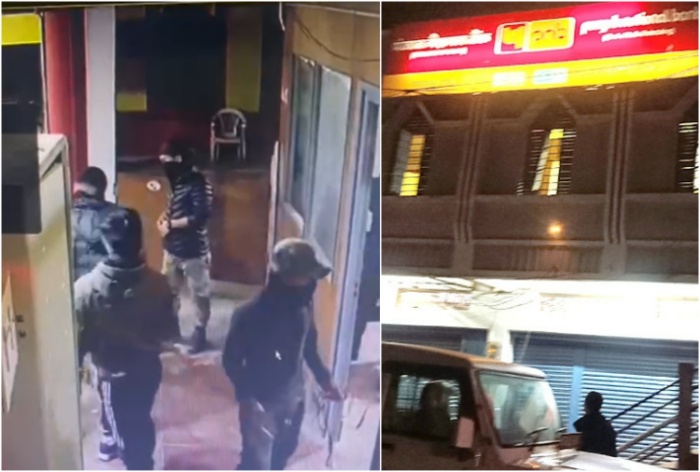Manipur Security Forces Dismantle Five Illegal Bunkers in Kangpokpi and Imphal East: A Decisive Operation for Regional Safety and Stability
In the dynamic landscape of Manipur, security and peace are paramount. Recently, our dedicated security forces executed a strategic operation that led to the dismantling of five illegal bunkers in the areas of Kangpokpi and Imphal East. This operation sends a clear message: unlawful activities will not be tolerated, and the safety of the community remains the highest priority.
Introduction: Setting the Stage for Security and Stability
Imagine living in a neighborhood where every alley and corner holds the promise of safety. Now, envision that this peace is continuously challenged by the hidden threats of illegal bunkers—structures that can harbor illicit activities and jeopardize the security of the community. In Manipur, a state that has long been at the crossroads of socio-political dynamics, ensuring stability is a constant endeavor. The recent dismantling of five illegal bunkers is a prime example of proactive measures taken by security forces to secure the region and safeguard its citizens.
This article takes you on a journey through the background, significance, and implications of this operation. We’ll explore how the dismantling of these bunkers is not just about eradicating illegal structures, but also about reinforcing the fabric of community trust and national security.
Background of Security Operations in Manipur
Manipur has a unique history—one marked by resilience and the continual pursuit of peace despite various challenges. For years, the state has seen sporadic incidents involving illegal bunkers and unauthorized structures that serve as safe havens for criminal elements and insurgent activities. These bunkers, often hidden away in remote or strategically located areas, have the potential to destabilize local security and hamper developmental initiatives.
Security forces in Manipur have consistently worked to counter these threats. Their operations are meticulous, driven by intelligence and supported by advanced tactical strategies. The dismantling of these illegal bunkers in Kangpokpi and Imphal East is a reflection of years of commitment to maintaining law and order in a region that has experienced its share of turbulence.
The Operation: A Closer Look at the Dismantling Process
What does it take to dismantle an illegal bunker? It’s a process that involves not only physical demolition but also a deep understanding of local dynamics, intelligence gathering, and coordination with various agencies. In this recent operation, our security forces meticulously planned each step, ensuring that the dismantling process was swift and safe.
- Intelligence and Surveillance:
Before any operation, gathering accurate intelligence is crucial. Security agencies had been monitoring these bunkers for some time. This intelligence allowed them to plan a strategic operation with minimal risk to civilians and personnel. Imagine a chess game where every move is calculated—this is how our security teams operate. - Coordination and Planning:
The success of such an operation lies in coordination. Multiple units and departments were involved in the planning process. Clear communication channels and predefined roles ensured that the operation could be executed seamlessly. This level of planning is akin to an orchestra playing in perfect harmony, where every instrument contributes to a flawless performance. - Execution of the Operation:
With the groundwork laid, the security forces moved in decisively. The operation was carried out with precision, ensuring that each illegal bunker was dismantled without delay. The safety of the local community was paramount, and strict protocols were followed to avoid collateral damage. In a way, this operation was like a well-rehearsed dance—each step coordinated and executed with exact timing. - Post-Operation Analysis:
Once the bunkers were dismantled, security forces conducted thorough checks to ensure that no remnants of illegal activity remained. This follow-up is critical in operations like these to prevent any quick resurgence of unlawful activities. It’s the equivalent of closing all doors and windows after a security breach to ensure no further entry is possible.
Significance of Dismantling Illegal Bunkers
Why is this operation so significant? The dismantling of illegal bunkers is more than just a tactical victory; it is a powerful statement against lawlessness and a reaffirmation of the state’s commitment to public safety.
- Enhanced Public Safety:
By removing these bunkers, the risk of these structures being used for criminal or insurgent activities is significantly reduced. Citizens can now feel safer knowing that their local security forces are vigilant and proactive. Think of it as clearing out weeds from a garden—once the unwanted elements are removed, the space is free to flourish and grow. - Deterrence to Future Illegal Activities:
The dismantling sends a clear message to any potential wrongdoers: illegal activities will not be tolerated, and there are serious consequences for those who attempt to destabilize the region. The visible presence of strong security measures acts as a deterrent, much like a well-lit street discourages unlawful behavior during the night. - Restoration of Community Trust:
For the residents of Kangpokpi and Imphal East, this operation is a breath of fresh air. When security forces act decisively, it helps rebuild trust between the community and the state. Residents now have a renewed sense of security and assurance that their government is committed to their welfare. - Strengthening Regional Stability:
Manipur’s stability has broader implications for the entire region. A secure Manipur means a more stable and peaceful neighborhood for bordering areas and even neighboring countries. The dismantling of these bunkers is a step towards ensuring that the region does not become a hotbed for illegal activities that could ripple across borders.
Community Impact: The Ripple Effects of Enhanced Security
When we talk about dismantling illegal bunkers, it’s easy to focus solely on the operational success. However, the impact of such actions extends far beyond the immediate security gains.
Local Business and Daily Life:
Illegal bunkers often disrupt local life in subtle but significant ways. They create an atmosphere of uncertainty and fear, which can deter investment and slow down economic activities. With these bunkers dismantled, local businesses can operate in a more secure environment, leading to economic stability and growth. It’s like removing a roadblock from a busy highway—traffic flows smoothly, and everyone reaches their destination without unnecessary delays.
Psychological Assurance:
The presence of illegal bunkers can leave communities feeling vulnerable and anxious. When security forces dismantle these threats, it provides psychological relief to the residents. There is comfort in knowing that those tasked with protecting the community are vigilant and effective. This psychological assurance is vital for community morale, fostering an environment where people can live, work, and play without constant worry.
Empowerment of Local Authorities:
Operations like these empower local authorities and law enforcement agencies. It boosts the confidence of the community in their local leaders and security personnel. When citizens see tangible results from their government’s efforts, it encourages a spirit of collaboration and mutual respect. The dismantling of the bunkers is a testament to what can be achieved when the state and community work together towards a common goal.
Challenges Faced by Security Forces
No operation is without its challenges. The process of dismantling illegal bunkers is fraught with obstacles that require skill, resilience, and adaptability.
Navigating Difficult Terrain:
Kangpokpi and Imphal East are regions where geography itself can pose challenges. Dense vegetation, rugged landscapes, and limited accessibility often complicate security operations. Our security forces had to maneuver through these natural barriers, ensuring that every step was taken with caution. Picture a mountain climber scaling a steep, rocky cliff—every move counts, and the margin for error is minimal.
Risk of Escalation:
Whenever illegal structures are involved, there is a risk of confrontation. Security forces must be prepared for any form of resistance. In this operation, the teams were fully geared to handle potential escalation, ensuring that the situation remained under control at all times. This readiness is akin to a firefighter being prepared for any sudden flare-up—a quick response is crucial to prevent a small fire from turning into a wildfire.
Coordination with Multiple Agencies:
The dismantling process often requires collaboration between different arms of the government—law enforcement, intelligence, local administrative bodies, and sometimes even community leaders. Coordinating these diverse groups requires clear communication and mutual trust. When all these entities work in sync, the operation becomes a well-oiled machine. However, any miscommunication can lead to delays or misunderstandings that might compromise the operation.
Time-Sensitive Execution:
Illegal bunkers are not static targets; they are often part of a broader network that can reorganize quickly. Timing, therefore, is critical. The security forces had to strike at just the right moment to ensure maximum impact and to prevent the bunkers from being reoccupied or fortified further. It’s similar to a game of chess where timing your moves precisely can mean the difference between victory and defeat.
Geopolitical and Strategic Implications
Manipur’s strategic location near international borders adds another layer of complexity and significance to such operations. The dismantling of illegal bunkers is not merely a local matter—it has broader geopolitical implications.
Cross-Border Security:
Manipur shares borders with regions that have historically been volatile. By neutralizing potential threats such as illegal bunkers, security forces are contributing to a safer cross-border environment. This proactive measure helps in preventing any spillover of insurgent or criminal activities into neighboring territories, thereby enhancing regional stability.
Strengthening Diplomatic Ties:
When a region is secure, it opens the door for enhanced diplomatic relations with neighboring countries. The success of such security operations reassures international partners that Manipur is a stable and reliable neighbor. This stability can lead to increased collaboration in areas such as trade, tourism, and cultural exchange, benefiting everyone involved.
Signal to Insurgents and Criminal Elements:
Illegal bunkers often serve as hideouts for insurgents and criminals who aim to destabilize the region. The dismantling operation sends a strong signal to these elements that their actions will not go unnoticed. It’s a clear message: the state is vigilant, prepared, and ready to act. This deterrent effect is crucial in maintaining long-term peace and discouraging any future attempts at illegal activities.
Innovative Approaches and Future Strategies
So, what comes next? The dismantling of these bunkers is a significant milestone, but it’s also a stepping stone towards further improvements in security operations.
Investing in Technology:
Modern security operations increasingly rely on technology. From drones for aerial surveillance to advanced monitoring systems, technology plays a pivotal role in ensuring that operations are efficient and safe. Future strategies may include more sophisticated tools that enable real-time data analysis and rapid response. Imagine having a high-tech security guard who can keep a constant watch over every corner—that’s the future our security forces are aiming for.
Community Engagement Initiatives:
A secure community is one where the citizens feel involved and informed. Future measures may focus on enhancing community engagement, where locals play an active role in reporting suspicious activities and supporting security operations. Just as a neighborhood watch program can deter criminal activities, a well-informed community can become the first line of defense against illegal operations.
Regular Audits and Inspections:
Ensuring that illegal structures do not resurface requires continuous monitoring. Regular audits and inspections can help in identifying potential threats before they escalate. This proactive approach is like maintaining a well-tuned engine—regular check-ups ensure that everything runs smoothly without unexpected breakdowns.
Enhanced Training Programs:
For security personnel, continuous training is essential. As challenges evolve, so too must the skills of those who protect us. Future initiatives may focus on advanced training programs that equip security forces with the latest techniques in counter-insurgency and intelligence gathering. The idea is to always stay one step ahead of potential threats.
The Role of Local Leadership and Administration
Local governance plays a crucial role in the success of security operations. When local leaders are proactive and cooperative, operations such as the dismantling of illegal bunkers are executed more efficiently.
Building Trust and Transparency:
Transparency in operations builds trust within the community. When local administrations work hand in hand with security forces, the people are more likely to support these measures. This trust acts as a catalyst for broader social cooperation—after all, a community that feels heard and protected is a community that thrives.
Collaborative Problem-Solving:
Local issues often require local solutions. In areas like Kangpokpi and Imphal East, administrators have a deep understanding of the unique challenges faced by their communities. This local insight, combined with the expertise of security forces, results in tailored strategies that address the root causes of insecurity. Think of it as a tailored suit—when it fits perfectly, it enhances both comfort and confidence.
Impact on the Socio-Economic Fabric
Security is not just about physical safety—it has far-reaching impacts on the socio-economic well-being of a region.
Boosting Economic Confidence:
When illegal bunkers and other security threats are removed, businesses feel more confident in investing in the area. Economic activities flourish when people are not constantly worried about their safety. It’s similar to gardening: when the soil is free from pests, the plants can grow and bear fruit without hindrance.
Creating a Conducive Environment for Development:
A secure region attracts development projects, whether it’s new infrastructure, educational institutions, or healthcare facilities. The removal of illegal elements paves the way for long-term developmental initiatives. With safety as the foundation, progress can build upward like a sturdy skyscraper reaching for the sky.
Enhancing Social Cohesion:
Security operations that protect community interests help in knitting the social fabric tighter. When citizens see that the government is actively working to protect them, it fosters a sense of unity and shared purpose. This social cohesion is the bedrock upon which any progressive society is built.
Challenges Ahead and How to Overcome Them
Even with successful operations like these, challenges remain. Security forces must continuously adapt to a changing landscape.
Adaptive Threats:
Illegal bunkers are just one facet of a broader spectrum of security challenges. Criminals and insurgents are always on the lookout for new ways to operate. To counter this, security forces must remain agile, continuously updating their tactics and leveraging technological advances.
Resource Allocation:
Operating in difficult terrains and complex socio-political environments requires resources—both human and technological. Ensuring that these resources are available and optimally used is a constant challenge. However, smart planning and strategic investments can help overcome these hurdles.
Balancing Development and Security:
In any region, there is a delicate balance between ensuring security and promoting development. Excessive security measures can sometimes stifle growth, while too little can lead to chaos. Finding the right balance requires continuous dialogue between all stakeholders—government, security forces, and the community.
Community Voices: Stories from the Ground
Behind every security operation, there are countless personal stories that add depth to the narrative. Local residents have expressed their relief and gratitude following the dismantling of the bunkers. For many, this operation has restored a sense of normalcy and hope.
Local Traders and Shopkeepers:
Many small business owners in Kangpokpi and Imphal East have felt the positive impact of a safer environment. One local trader mentioned how the operation not only removed an eyesore from the community but also opened up the area for new opportunities and investments.
Family and Community Leaders:
Parents and community leaders have echoed similar sentiments. The safety of children and the promise of a peaceful environment are priceless. For these families, the operation is a symbol of the state’s dedication to ensuring that future generations can thrive without the shadows of fear.
Long-Term Vision: Securing Manipur’s Future
Looking ahead, the dismantling of these illegal bunkers is just the beginning. It’s a stepping stone towards a more secure, prosperous, and harmonious Manipur.
Expanding Surveillance Networks:
Future plans may include the expansion of surveillance networks to monitor remote areas where illegal structures could potentially emerge. Such measures will help in early detection and prompt intervention, much like having an early warning system that alerts you to any impending danger.
Strengthening Cross-Sector Collaboration:
Effective security is not a one-man show. It requires the combined efforts of law enforcement, local government, community organizations, and even private entities. Strengthening these collaborative networks will ensure that Manipur is well-prepared to handle any future threats.
Empowering Youth and Communities:
A critical aspect of future security measures is community empowerment. Educating and involving the youth in security and civic activities can create a self-sustaining model of vigilance and cooperation. When every member of the community becomes a stakeholder in peace and progress, the entire region benefits.
Conclusion: A Milestone in Manipur’s Security Journey
The successful dismantling of five illegal bunkers in Kangpokpi and Imphal East stands as a proud moment for Manipur’s security forces and the community at large. This operation is not merely about removing physical structures—it symbolizes a commitment to a safer, more prosperous future for all.
When you look at the bigger picture, it’s clear that every decisive action, every coordinated effort, and every strategic move contributes to a more secure and united Manipur. From ensuring the safety of local residents to strengthening regional stability, the dismantling of these bunkers is a testament to the relentless spirit of our security forces and the unwavering support of the community.
As we move forward, let this operation serve as a reminder that when we work together—security forces, government, and the people—the impossible becomes possible. The future of Manipur shines bright, with every step taken towards security paving the way for development, growth, and lasting peace.
FAQs
Q1: What prompted the dismantling of the illegal bunkers in Kangpokpi and Imphal East?
A: The operation was initiated following intelligence reports and continuous surveillance that identified these bunkers as potential hubs for illegal activities. The security forces acted decisively to neutralize this threat and enhance public safety.
Q2: How do illegal bunkers affect local communities in Manipur?
A: Illegal bunkers can serve as hideouts for criminal and insurgent activities, creating an atmosphere of fear and instability. Their presence disrupts daily life, deters business investments, and undermines community trust in local governance.
Q3: What measures are being taken to prevent the re-emergence of similar illegal structures?
A: Future strategies include enhanced surveillance, regular inspections, community engagement, and technological upgrades. These measures aim to detect and dismantle any illegal structures before they can re-establish.
Q4: How has the local community responded to this security operation?
A: The community has expressed relief and gratitude. Many locals feel safer and more confident in the government’s ability to protect them, which has positively impacted both social and economic aspects of daily life.
Q5: What long-term benefits does this operation bring to the region?
A: In addition to immediate security improvements, the operation sets a strong precedent for law enforcement, boosts investor confidence, strengthens regional stability, and lays the groundwork for further developmental initiatives in Manipur.






